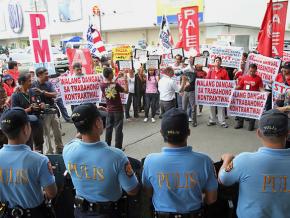Taking on Philippines Airlines
reports on the struggle by Philippine's airline workers to stop union busting and outsourcing.
IN THE Philippines, a modern-day Grinch stole Christmas from some 2,600 airline workers.
Lucio Tan, the second-richest person in the Philippines and owner of the national flag carrier Philippine Airlines (PAL), fired 70 percent of the airline's unionized ground crew that comprise the entire airport services, in-flight catering and call-center reservations departments, as part of an outsourcing program.
The outsourcing scheme is actually a fire-then-rehire scam, in which the same workers are asked to apply as contractual employees in service providers that simply front for billionaire Tan. As contractual hires, the workers would be doing the same job as before, but with a big pay cut, fewer benefits, more hours of work, no security of tenure and without a union to serve as their voice and protection.
Ginalyn Licayan, a single mother, worked as a reservation sales associate at PAL for eight years. Licayan was terminated last October 1, and her job was outsourced to SPI Global. Ricardo Abuyuan, a supervisor at the cargo division, had chalked up 36 long years of service to PAL and was due to retire a few years from now. His department was outsourced to Sky Logistics.

Benito Ignalig worked as demi-chef for 20 years. He wonders why the in-flight catering department, which he believes is vital to PAL's international flights, was outsourced to Sky Kitchen.
Gerry Rivera, president of the Philippine Airlines Employees' Association (PALEA), which represents the ground crew, was a supervisor at the ramp services division and worked for 28 years. A bit more senior, at 31 years, is PALEA Secretary Bong Palad, also a supervisor at the same division. Their department has also been outsourced to Sky Logistics. Finally, Al Ramiso, of the passenger services division, had spent more than half of his life at PAL before the mass layoff.
Rivera, Palad, Ramiso, Ignalig, Abuyuan and Licayan are all PALEA officers and their termination, along with 62 percent of the union leadership, is a patent case of union-busting.
If Licayan had accepted the separation package and applied for SPI Global, her $508 in salaries and allowances would be reduced to $227. A master mechanic for PAL receiving a salary of $634 will, upon transfer to Sky Logistics, be given only a salary of $252.
In the service provider, the workday is eight hours for six days a week, compared to seven point five hours for five days a week at PAL. PAL employees with 20 or 30 years of work experience will be turned into probationary workers for six months when they transfer to the service provider.
Thus, PALEA staged a two-year-long legal battle and mass struggle against the outsourcing plan. But ultimately, the government, through decisions of the Labor Department and the Office of the President, gave the "go" signal for the outsourcing plan last August.
ON SEPTEMBER 27, PALEA launched a sit-down strike that completely paralyzed operations. The response of PAL and the government was the forcible eviction of protesting PALEA members out of the airport and other offices, using an overwhelming force of police and security guards.
PALEA has set up picket lines outside the international airports of Manila and Cebu, the two biggest cities in the Philippines. Every day, hundreds of PALEA members alternate in shifts to maintain the protest camps, which have been declared to be part of the Occupy movement. The camp in Manila has been attacked by hired goons twice, but vigilant PALEA members forced them to retreat--though several workers were injured as a result.
In its pleadings with the government, PAL's alibi was that it was losing money. But last year, PAL posted a net income of $72.5 million. This is aside from paying $46.5 million in debts last year. This year, PAL is projecting a modest profit. It is a lie that PAL is on the brink of ruin. The truth is that the company wants to elude contract negotiations and bust the union.
An unprecedented unity of unions in the Philippines spanning the whole spectrum from the conservative to the militant had been forged in solidarity with PALEA. An even broader social coalition involving the influential Roman Catholic Church, progressive parties, community organizations, student groups and nonprofits is also supporting the fight against outsourcing and contractualization.
PALEA's supporters have ratcheted up the campaign by calling for a boycott of PAL and its low-cost sister carrier, Air Philippines, to put pressure on the company. An unparalleled international solidarity also has been undertaken by unions around the world. Solidarity actions were launched in late October through January by unions in Tokyo, Washington D.C., San Francisco, Los Angeles, Chicago, New York, Hong Kong, Toronto and Melbourne.
PALEA is calling on PAL to open talks for the resolution of the labor dispute. The union is demanding a stop to the outsourcing plan and the reinstatement of the employees to their regular jobs.
PALEA has likened its fight to the Professional Air Traffic Controllers Organization (PATCO) strike under Ronald Reagan. Reagan fired the strikers and broke the union. Since then, the bargaining power of American labor unions has been severely undermined.
Similarly, the fate of the labor movement in the Philippines hangs on the outcome of PALEA's trailblazing fight against contract labor and for regular jobs.


